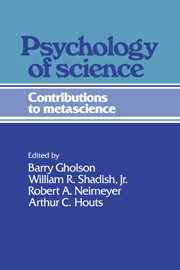Book contents
- Frontmatter
- Contents
- Preface
- Contributors
- 1 The psychology of science: An introduction
- Part I Historical issues in the psychology of science
- Part II The case for a psychology of science
- Part III Creativity and the psychology of science
- Part IV Cognition in the psychology of science
- Part V Social factors in the psychology of science
- Part VI Epilogue and Prologue
- Author index
- Subject index
Preface
Published online by Cambridge University Press: 05 June 2012
- Frontmatter
- Contents
- Preface
- Contributors
- 1 The psychology of science: An introduction
- Part I Historical issues in the psychology of science
- Part II The case for a psychology of science
- Part III Creativity and the psychology of science
- Part IV Cognition in the psychology of science
- Part V Social factors in the psychology of science
- Part VI Epilogue and Prologue
- Author index
- Subject index
Summary
The seeds of this book were sown originally in a series of discussions by its four editors, begun in January 1985 in the Psychology Department at Memphis State University. The proximal cause of those discussions was provided by Tom Cook of Northwestern University, who was a visiting scholar with the Center for Applied Psychological Research during the first three months of that year. Tom simply pointed out the obvious to us – something it often takes an outsider to do. He noted that the four of us shared interests in philosophy, history, and sociology of science. Specifically, Neimeyer (1985) had conducted a sociological analysis of the growth of personal construct theory from the perspective of Nicholas Mullins's model of the development of theory groups. Gholson had compared and criticized recent philosophy of science by Kuhn, Lakatos, and Laudan, using the paradigm clashes between competing conditioning and cognitive theories as an example (Barker & Gholson, 1984a, 1984b; Gholson & Barker, 1985). Houts had examined the nature of psychologists' value systems and their influence on scientific orientation (Krasner & Houts, 1984). Shadish had written about salient epistemological problems arising in program evaluation (Cook & Shadish, 1986; Shadish, 1986).
Of course, each of us had been aware of the others' works, and of the possible mutual interests that were implied. Tom Cook's prompt was most helpful because he pointed out that such a concentration of interests in metascience was somewhat unusual in a psychology department, and that we ought to do something constructive to take advantage of the situation.
- Type
- Chapter
- Information
- Psychology of ScienceContributions to Metascience, pp. ix - xiiPublisher: Cambridge University PressPrint publication year: 1989



